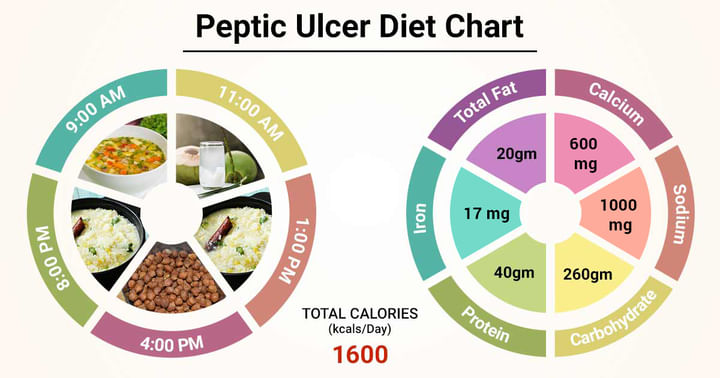Get the App
For Doctors
Login/Sign-up
About
Health Feed
Find Doctors
Diet Chart For peptic ulcer
Last Updated: Jan 20, 2025
About
Stomach ulcers are essentially open sores within the lining of the stomach. They are a type of peptic ulcers caused either by inflammation or by the erosion from stomach acids. They can be very painful considering the amount of acid present in the stomach. Individuals suffering from peptic ulcers are given antibiotics to reduce the secretion of acid in the stomach. To enhance the remedy from medication, they are advised to follow a diet that also seeks to block stomach acid. Some of the foods that are known to do so are as follows.
Flavonoids – Flavonoids are gastro-protective meaning they defend the stomach’s lining, heal ulcers and prevent them from forming. Grapes, broccoli, apples, legumes, kale, berries and tea (particularly green tea) are rich sources of flavonoids.
Probiotics – Probiotics are known to enhance recovery when complemented with antibiotics. Probiotics are yeast and other microorganisms that provide the digestive tract with necessary microbes. Food sources rich in probiotics are buttermilk, yogurt and kefir.
Honey – Honey, a natural sweetener, is a potent antibacterial which is known to inhibit the growth of the bacteria responsible for causing peptic ulcers.
It is advised to avoid caffeinated and carbonated beverages, salty and spicy foods, fried foods, processed foods and foods with high acidic content such as citrus fruits and tomatoes.
Diet Chart
| Sunday | |
| Breakfast (8:00-8:30AM) | Vegetable soup (1 cup) |
| Mid-Meal (11:00-11:30AM) | Tender coconut water (1 cup) + 1 Apple (Unskinned) |
| Lunch (2:00-2:30PM) | Khichdi (1/2 cup) |
| Evening (4:00-4:30PM) | Boiled Black grams (1/3rd cup) + Black Tea (1 cup) |
| Dinner (8:00-8:30PM) | Khichdi (1/2 cup) |
| Monday | |
| Breakfast (8:00-8:30AM) | Boiled White Chickpeas n Tomato (1 cup) |
| Mid-Meal (11:00-11:30AM) | Tender coconut water (1 cup) + Grapes (1/2 cup) |
| Lunch (2:00-2:30PM) | Chapati (2) + Fish(1pc.) stew |
| Evening (4:00-4:30PM) | Roasted Rice Flakes (1/2 cup) + Black Tea (1 cup) |
| Dinner (8:00-8:30PM) | Boiled Rice (1/2 cup) + Baked Pumpkin (1/3rd cup) |
| Tuesday | |
| Breakfast (8:00-8:30AM) | Carrot soup (1 cup) |
| Mid-Meal (11:00-11:30AM) | Tender coconut water (1 cup) + Pomegranates (1/2 cup) |
| Lunch (2:00-2:30PM) | Boiled rice (1/2 cup) + Cabbage curry (1/3rd cup) |
| Evening (4:00-4:30PM) | Boiled Potato n Black grams (1/2 cup) + Black Tea (1 cup) |
| Dinner (8:00-8:30PM) | Boiled Rice (1/2 cup) + Mashed potato(2) + 1tsp Ghee |
| Wednesday | |
| Breakfast (8:00-8:30AM) | Vegetable soup (1 cup) |
| Mid-Meal (11:00-11:30AM) | Tender coconut water (1 cup) + 1 Guava |
| Lunch (2:00-2:30PM) | Carrot Uttappam (1) + Raita (1/3rd cup) |
| Evening (4:00-4:30PM) | Puffed Rice (1/2 cup) + Black Tea (1 cup) |
| Dinner (8:00-8:30PM) | Khichdi (1/2 cup) |
| Thursday | |
| Breakfast (8:00-8:30AM) | Baked Tomato n Brolli wity bell peper soup (1 cup) |
| Mid-Meal (11:00-11:30AM) | Tender coconut water (1 cup) + Ripe Papaya (1/3rd cup) |
| Lunch (2:00-2:30PM) | Chapati (2) + Baked vegetables (1/2 cup) + Raita (1/3rd cup) |
| Evening (4:00-4:30PM) | Boiled Black grams (1/3rd cup) + Black Tea (1 cup) |
| Dinner (8:00-8:30PM) | Boiled Rice (1/2 cup) + Bottle gourd curry (1/3rd cup) |
| Friday | |
| Breakfast (8:00-8:30AM) | Broccoli n Bell peper soup (1 cup) |
| Mid-Meal (11:00-11:30AM) | Tender coconut water (1 cup) + 1 Orange |
| Lunch (2:00-2:30PM) | Boiled Rice (1/2 cup) + Lentil soup (1/2 cup) |
| Evening (4:00-4:30PM) | Roasted Rice Flakes (1/2 cup) + Black Tea (1 cup) |
| Dinner (8:00-8:30PM) | Boiled Rice (1/2 cup) + Fish(1pc.) stew (1/3rd cup) |
| Saturday | |
| Breakfast (8:00-8:30AM) | Carrot n Beetroot soup (1 cup) |
| Mid-Meal (11:00-11:30AM) | Tender coconut water (1 cup) + 2 Chikus |
| Lunch (2:00-2:30PM) | Dosa (1) + Samber (1/2 cup) |
| Evening (4:00-4:30PM) | Boiled Potato n Black grams (1/2 cup) + Black Tea (1 cup) |
| Dinner (8:00-8:30PM) | Boiled Rice (1/2 cup) + Pointed gourd(without seeds n Unskinned) Curryurry |
Food Items To Limit
- Coffee and/or tea- Caffeine content which leads to GERD.
- Chocolate- It is well known as an acid producing food stuff.
- Spicy food- Spices and 'masalas' as we call it, are always proved to be an irritating agent and many a times the cause for gastric irritation.
- Alcohol- It not only adds empty calories to the body but also worsens the condition by excessive fermentation of sugar present in it as a result excess acid production in the stomach in combination of others ligitimate conditions may lead to ulcers.
- Acidic foods, such as citrus and tomatoes- The higher the acidic content of the foods the more probability of excess acidic evironment inside the stomach and so ulcers.
- Uncooked foods may be a risk factor for transmitting H.pylori, as it is the prime cause of the ulcer.
Do's And Dont's
Do's:
- Being overworked and overstressed are like extending a direct invitation to gastric problems. The body loses its ability to perform normal digestive functions and is often associated with increased production of stomach acids.
- Having 5 small easily digestible meals a day at proper intervals is a key to good digestive health. Eating slowly without talking and chewing the food properly also improves digestion. It reduces intestinal gas as less air is swallowed during the eating process. Emotional eating too causes such disorders. So it is very important to fix any so called underlying reasons, be it psychological or emotional to make a complete recovery from the said condition.
- Any physical activity which helps you break into a sweat improves the process of metabolism and assimilation in the body. Breathing exercises and yoga can bring relief from bloating, flatulence and other symptoms of indigestion and intestinal gas.
- A prerequisite in order to achieve a healthy digestive process is an efficiently hydrated body. Drinking 8-10 glasses of water every day is mandatory to prevent any gastric complications.
- Drinking 2-3 glasses of luke warm water first thing in the morning is said to help with regular bowel movements and relieve indigestion and flatulence.
- Probiotics are the friendly bacteria of the gut. They help in breaking down the food and making it easy for the body to digest it. Fermented milk products like yogurt contain the bacteria lactobacillus which is known to promote digestion.
- Non glutenous grains, non citric fruits and vegetables, high fiber and lean protein meats are the best choices.
- One of the best known herbs to treat gastritis is ginger. It heals the gastric lining and reduces inflammation. It reduces vomiting tendencies and is known for its anti microbial prowess.
Don'ts:
- Avoiding foods like complex carbohydrate and proteins (difficult to be broken down) following a gastric attack would be a good idea.
- Avoiding alcohol and smoking is absolutely essential to recover from a gastric attack. Prolonged intake of these could cause irrepairable damage to the gut.
- Staying away from certain medications like acetaminophens, analgesics, ibuprofen, non steroidal anti inflammatory drugs is important in preventing gastritis. It is essential to ask one’s physician as to which other medications one could opt for in the given condition.
- Caffeinated beverages like sodas, tea and coffee should be in taken in a controlled portion.
- Keeping away from wheat, tomatoes, lemons, red meat etc is essential. Staying away from dairy is also recommended in gastritis. Anything hot and spicy like peppers, black pepper or red chili powder should be kept away from.
- Vegetables like cabbage, broccoli, brussel sprouts, beans are tougher on the gut and should be stayed away from.
Food Items You Can Easily Consume
- Cereals & Pulses: Cereals (rice, oats, jowar, bajra and ragi) and pulses (red gram, green gram, bengal gram and black gram dals).
- Fruits & vegetables: Fruits (stewed apple, banana, papaya, pomegranate, pear, melons (water melon, musk melon) and vegetables (all gourds, ladies finger, tinda, green leafy vegetables (indian spinach, fenugreek leaves, corriander leaves).
- Meat, Fish & Poultry: Lean meat, skin less chicken, fish (mackerel, trout, sardine, salmon, tuna).
- Milk & Milk products: Yoghurt, other fermented milk products. Nuts & Oils: Almonds, walnuts, pista, olive oil, canola oil, sun flower oil, rice bran oil.
References
- Farzaei MH, Abdollahi M, Rahimi R. Role of dietary polyphenols in the management of peptic ulcer. World Journal of Gastroenterology: WJG. 2015 Jun 7;21(21):6499. [Cited 01 July 2019]. Available from:
- Cheney G. Anti-peptic ulcer dietary factor (vitamin 'U') in the treatment of peptic ulcer. Journal of the American Dietetic Association. 1950;26:668-72. [Cited 01 July 2019]. Available from:
- Welsh JD. Diet therapy of peptic ulcer disease. Gastroenterology. 1977 Apr 1;72(4):740-5. [Cited 01 July 2019]. Available from:
Book appointment with:
Delhi
Mumbai
Chennai
Bangalore
Index
Table of content
Content Details
Written ByDrx Hina FirdousPhD (Pharmacology) Pursuing, M.Pharma (Pharmacology), B.Pharma - Certificate in Nutrition and Child CarePharmacology
Reviewed By
Find Dietitian/Nutritionist near me
Ask a free question
Get FREE multiple opinions from Doctors
posted anonymously



